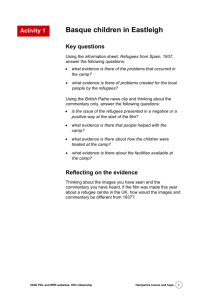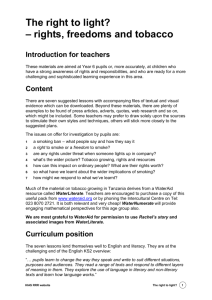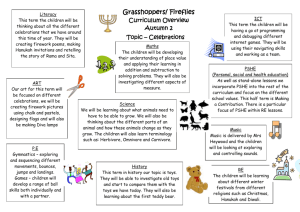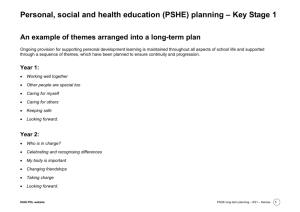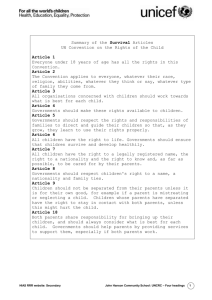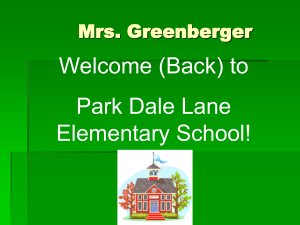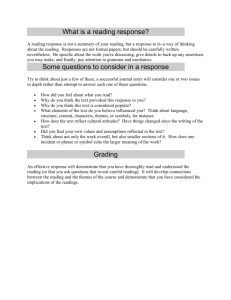PSHE planning – Foundation Stage
advertisement
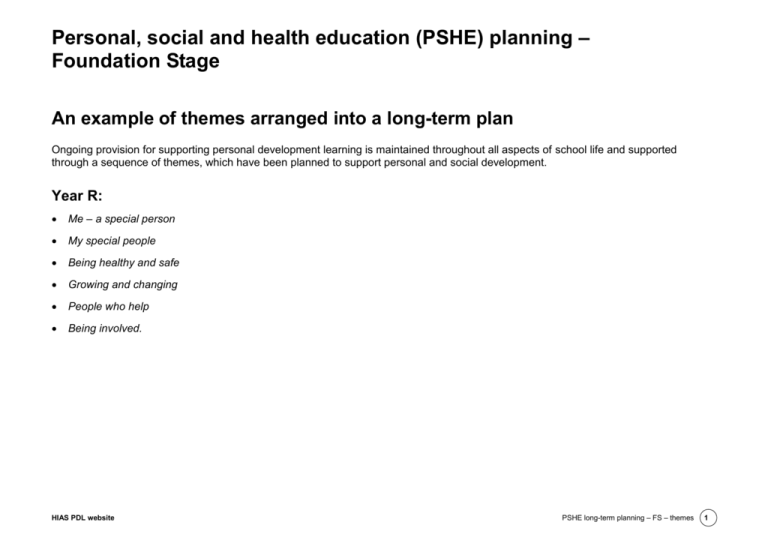
Personal, social and health education (PSHE) planning – Foundation Stage An example of themes arranged into a long-term plan Ongoing provision for supporting personal development learning is maintained throughout all aspects of school life and supported through a sequence of themes, which have been planned to support personal and social development. Year R: Me – a special person My special people Being healthy and safe Growing and changing People who help Being involved. HIAS PDL website PSHE long-term planning – FS – themes 1 Year R – Me – a special person Early learning goals, QCA Objectives Suggested activities Outcomes for personal and social development By the end of the Foundation Stage most children will: Children should have opportunities to: Children can: 2 continue to be interested, excited and motivated to learn have a developing awareness of their own needs, views and feelings, and be sensitive to the needs, views and feelings of others respond to significant experiences, showing a range of feelings when appropriate work as part of a group or class, taking turns and sharing fairly, understanding that there needs to be agreed values and codes of behaviour for groups of people, including adults and children, to work together harmoniously understand that they can expect others to treat their needs, views, cultures and beliefs with respect. PSHE long-term planning – FS – themes recognise their uniqueness feel good about themselves know personal likes, dislikes and preferences recognise, name and own everyday feelings such as happy, sad, cross, worried, etc know some of the things that can cause different feelings learn that bullying is not acceptable take turns understand classroom rules and routines, including personal hygiene learn about some of the school rules, including medicines in school. Look in a mirror and discuss similarities and differences. Paint a self-portrait for display. Circle time – what makes me special? Celebrate achievements at home and in school, in behaviour and for work, through stickers, assemblies, certificates; circle time – what I am good at – all about me. Circle time – what I like, prefer, dislike for breakfast, doing at home or school; make a bar graph; make an All about me book. Preferences – comparing stories, choosing circle time games; making choices about activities – planning board. Role play. Posters/cards showing expressions. Stories. Circle time – I am happy, sad, etc, when ... Stories – Farmer Duck and discuss. Explain bullying and link to the feelings objective; teach strategies for dealing with the situation, eg: tell an adult. recognise and name everyday feelings name their likes and dislikes name positive qualities about themselves understand classroom rules and routines. HIAS PDL website Early learning goals, QCA Objectives Suggested activities Outcomes for personal and social development Games – Snap, Lotto; role play and play situations. Circle time as a focus on co-operative games, introduce Talking Ted as a means of taking turns to speak. Class task, responsibility board. Teach routines – washing hands after using toilet, before lunch; flushing toilet; daily routines – washing, brushing teeth, etc. Discussion, songs (Mulberry bush), posters, role play. Develop class rules, each child to draw and sign a picture to show ownership. Circle time; assemblies; stories, role play, puppets; visit from school nurse or health visitor, what to do if you hurt yourself in school; medicine procedures; asthma inhalers. Have you thought about? Arranging a visit from a school nurse or health visitor. Building productive links with other areas of learning. Resources Books and stories – Where’s my teddy?, by Jez Alborough, Dogger, by Shirley Hughes, Farmer Duck, by Martin Waddell. Stories – No more teasing, by Emma Chichester Clark. Posters from health promotion departments. HIAS e-Profile CD. Assessment opportunities HIAS PDL website Individual All about me books. Using story scenarios, each child has a set of facial expressions and can hold up the appropriate one and explain the reason for their choice. Children can respond to adult instructions. Children can organise themselves for the start of the school day. PSHE long-term planning – FS – themes 3 Links Every Child Matters Be healthy Mentally and emotionally healthy. Stay safe Safe from bullying and discrimination. RRR Articles: 12 (opinions), 15 (joining groups), 29 (developing personal talents), 33 (protection from drugs). Healthy Schools Emotional health and well-being Provide opportunities for children to participate in school activities and responsibilities to build their confidence and self-esteem. SEAL 4 PSHE long-term planning – FS – themes Good to be me HIAS PDL website Year R – My special people Early learning goals, QCA Objectives Suggested activities Outcomes for personal and social development By the end of the Foundation Stage most children will: Children should have opportunities to: Children can: continue to be interested, excited and motivated to learn have a developing respect for their own cultures and beliefs, and those of other people respond to significant experiences, showing a range of feelings when appropriate form good relationships with adults and peers consider the consequences of their words and actions for themselves and others understand that they can expect others to treat their needs, views, cultures and beliefs with respect. say why someone is special to them recognise ways in which their family/carer is special recognise what they are good at from what others tell them show a willingness to care about others learn when to say “Thank you” and “Sorry”. Have you thought about? HIAS PDL website Display of special toys, books, objects to explain the meaning of special. Circle time or class discussion about who is special to the children. Draw or paint a special person, label who and why they are special. Photo of special people in my life. Talk about photo to a partner. Make an All about me book. Stories – as a stimulus, as a response, that needs finishing. Circle time repartee. Child says “I am good at ...”, teacher responds “How do you know?” Define care about – who loves/likes you? Discussion and story – Can’t you sleep, Little bear? Role play, drama and games involving saying “Thank you” and “Sorry” in a range of situations. talk about a person who is special to them and describe their special qualities understand that most special people will always care for them and help them make things and share things with friends help other children who do not have friends remember to say “Thank you” and “Sorry”. All staff focus on saying “Thank you” and “Sorry” – teachers, lunchtime supervisers, administrative staff. Class book or display of situations which require “Thank you” and “Sorry”. Building productive links with other areas of learning. PSHE long-term planning – FS – themes 5 Books and stories which demonstrate a range of feelings or family situations, such as Can’t you sleep, Little Bear?, by Martin Waddell. Stories – Don’t hit your sister, by Myra Barns. HIAS e-Profile CD. Assessment opportunities Observations by teacher or learning support assistant of circle time or playground play. Child is able to give reason of why they are special – with reference to their own special people. Links Every Child Matters Resources Make a positive contribution Develop positive relationships and choose not to bully and discriminate. RRR Articles: 3 (adult involvement), 5 (family guidance), 9 (staying with parents), 12 (opinions), 20 (looked after properly). Healthy Schools Emotional health and well-being Have clear, planned curriculum opportunities for children to understand and explore feelings using appropriate learning and teaching styles. SEAL 6 PSHE long-term planning – FS – themes Relationships: Say no to bullying. HIAS PDL website Year R – Being healthy and safe Early learning goals, QCA Objectives Suggested activities Outcomes for personal and social development By the end of the Foundation Stage most children will: Children should have opportunities to: Children can: continue to be interested, excited and motivated to learn be confident to try new activities, initiate ideas and speak in a familiar group respond to significant experiences, showing a range of feelings when appropriate understand what is right, what is wrong, and why understand that they can expect others to treat their needs, views, cultures and beliefs with respect. make simple choices between activities, foods, etc think about being well and being unwell talk about medicines. Have you thought about? Resources Assessment opportunities HIAS PDL website Stick favourite foods pictures from magazines onto paper plates and discuss choices. Make choices about snack time – milk or water; apple or banana. Decide who to play with. Discuss how characters in stories feel when they are well/unwell – doctors, no school, take medicine, etc. Practical activity – what goes on or in the body? Extend by gathering children’s ideas. Create a medicine chest of familiar medicine. Teach that only adults/some adults can give you medicines. Who can give you breakfast, playtime snack, packed lunches, medicines? Could friends do this? Visitor in the classroom. Arranging a visit from a doctor, nurse or dental health professional. Building productive links with other areas of learning. Books and stories. Collection of day-to-day medicines in a medicine chest. Community police officer. Hampshire Fire and Rescue Service. HIAS e-Profile CD. Discussion about mealtimes. Observation of structured and non-structured play. make healthy choices from a limited range describe when they need medicines. PSHE long-term planning – FS – themes 7 Links Every Child Matters Be healthy Healthy lifestyle. Choose not to take illegal drugs. Stay safe Safe from accidental injury and death. RRR Articles: 3 (adult involvement), 12 (opinions), 24 (health care), 33 (protection from drugs). Healthy Schools Healthy eating Ensure that children have opportunities to learn about different types of foods in the context of a balanced diet. SEAL 8 PSHE long-term planning – FS – themes Good to be me. HIAS PDL website Year R – Growing and changing Early learning goals, QCA Objectives Suggested activities Outcomes for personal and social development By the end of the Foundation Stage most children will: Children should have opportunities to: Children can: continue to be interested, excited and motivated to learn have a developing awareness of their own needs, views and feelings, and be sensitive to the needs, views and feelings of others respond to significant experiences, showing a range of feelings when appropriate dress and undress independently and manage their own personal hygiene understand that they can expect others to treat their needs, views, cultures and beliefs with respect. learn and practise skills for maintaining personal hygiene be proud of their body and enjoy what it can do learn the names of the main parts of the body understand the idea of growing from young to old. Have you thought about? HIAS PDL website Teach routines and explain what they are for. Make pictorial reminders for other children of hygiene routines, such as flushing toilet and washing hands. Encourage demonstration of skills, such as in physical education lessons and outdoor play. Celebrate out-of-school activities, such as swimming, riding a bicycle. Action rhymes and songs, such as I’ve got a body; and touch head, shoulders, fingers, toes rhymes. Circle time – Simon says. Draw and label a picture of the body – individual and class display. Children bring in photos to make a personal timeline. Displays of babies, toys. Visitors – grandparent, mother and baby/toddler, older child. Story – Tell me what it’s like to be big. manage personal hygiene routines in school talk about how they have changed since they were a baby use names for the parts of their bodies they can see. Inviting family members in as visitors. Involving the school nurse. Building productive links with other areas of learning. PSHE long-term planning – FS – themes 9 Books and stories. Stories such as Tell me what it’s like to be big, by Joyce Dunbar. Health for life: ages 4-7, by Noreen Wetton and Trefor Williams (ISBN: 978-0174233862). HIAS e-Profile CD. Assessment opportunities Sequencing pictures. Label a picture – adult scribe if necessary. Links Every Child Matters Resources Be healthy Healthy lifestyle. RRR Articles: 12 (opinions), 24 (health care), 29 (developing personal talents). Healthy Schools Healthy eating Involve children and parents/carers in guiding food policy and practice within the school, enabling them to contribute to healthy eating and act on their feedback. SEAL 10 PSHE long-term planning – FS – themes Changes. HIAS PDL website Year R – People who help Early learning goals, QCA Objectives Suggested activities Outcomes for personal and social development By the end of the Foundation Stage most children will: Children should have opportunities to: Children can: continue to be interested, excited and motivated to learn be confident to try new activities, initiate ideas and speak in a familiar group respond to significant experiences, showing a range of feelings when appropriate understand that people have different needs, views, cultures and beliefs which need to be treated with respect understand that they can expect others to treat their needs, views, cultures and beliefs with respect. Have you thought about? Resources Assessment opportunities HIAS PDL website know the people who look after them and their different roles and responsibilities understand that there are differences and similarities between people talk to adults and listen to their experiences. Make a My family book or a Special person book of mum, dad, step-parent, carer, grandparent, brothers and sisters, aunts and uncles, best friend, and other special people. Visit other members of staff around the school, have them visit the class or assembly to talk to children and encourage them to ask questions. Visits from family members/ carers or outside agencies, such as school nurse, police officer, speech therapist. Role play of different roles and how they help. talk about ways in which adults can help them draw or write about visitors they have met ask for help from an adult. Inviting visitors into the classroom. Building productive links with other areas of learning. Books and stories. Visitors from within and outside school – community police officer, Hampshire Fire and Rescue Service, etc. HIAS e-Profile CD. Observation of, and discussion about, role play. PSHE long-term planning – FS – themes 11 Links Every Child Matters Make a positive contribution Develop positive relationships and choose not to bully and discriminate. RRR Articles: 3 (adult involvement), 12 (opinions). Healthy Schools Emotional health and well-being Identify vulnerable individuals and groups and establish appropriate strategies to support them and their families/carers. SEAL 12 PSHE long-term planning – FS – themes Going for goals! HIAS PDL website Year R – Being involved Early learning goals, QCA Objectives Suggested activities Outcomes for personal and social development By the end of the Foundation Stage most children will: Children should have opportunities to: Children can: continue to be interested, excited and motivated to learn maintain attention, concentrate and sit quietly when appropriate respond to significant experiences, showing a range of feelings when appropriate form good relationships with adults and peers work as part of a group or class, taking turns and sharing fairly, understanding that there needs to be agreed values and codes of behaviour for groups of people, including adults and children, to work together harmoniously select and use activities and resources independently understand that they can expect others to treat their needs, views, cultures and beliefs with respect. HIAS PDL website learn to co-operate by taking turns and joining in join in and enjoy a range of activities make simple choices between activities know what they enjoy and what they are good at care for plants or pets. Circle time. Activities using a parachute. Games involving taking turns, such as Lotto, Snakes and ladders. Everyday opportunities for responsibility. Work with a partner. Role play and puppets. Job planning board with opportunities for choices. Plan independent activities together. All about me book as a personal profile. Pet day – pet or plant topic. Plant seeds, and growing and caring for plants. Develop instructions for looking after plants and pets – writing, scribed, taped. describe their likes and dislikes give a reason for a preference they have take turns carry out instructions independently when undertaking tasks or responsibilities make a choice. PSHE long-term planning – FS – themes 13 Have you thought about? Resources Inviting a vet to visit the class. Having a visit from a mobile farm or the school grounds unit. Visiting a farm. Building productive links with other areas of learning. Books and stories. Parachute. Seeds and plants. Puppets. A range of turn-taking games. HIAS e-Profile CD. Written, pre-recorded or scribed instructions. Observation of paired or group activities. Early Years and Foundation Stage e-Profile assessment. Assessment opportunities Links Every Child Matters Enjoy and achieve Ready for school. Attend and enjoy school. Make a positive contribution Engage in decision making and support the community and environment. RRR Articles: 12 (opinions), 13 (share information), 17 (mass media), 29 (developing personal talents). Healthy Schools PSHE Have mechanisms in place to ensure children’s views are reflected in curriculum planning, teaching and learning, and the whole-school environment, including those with SEN and specific health conditions, as well as disaffected children. SEAL 14 PSHE long-term planning – FS – themes New beginnings, Getting on and falling out. HIAS PDL website
